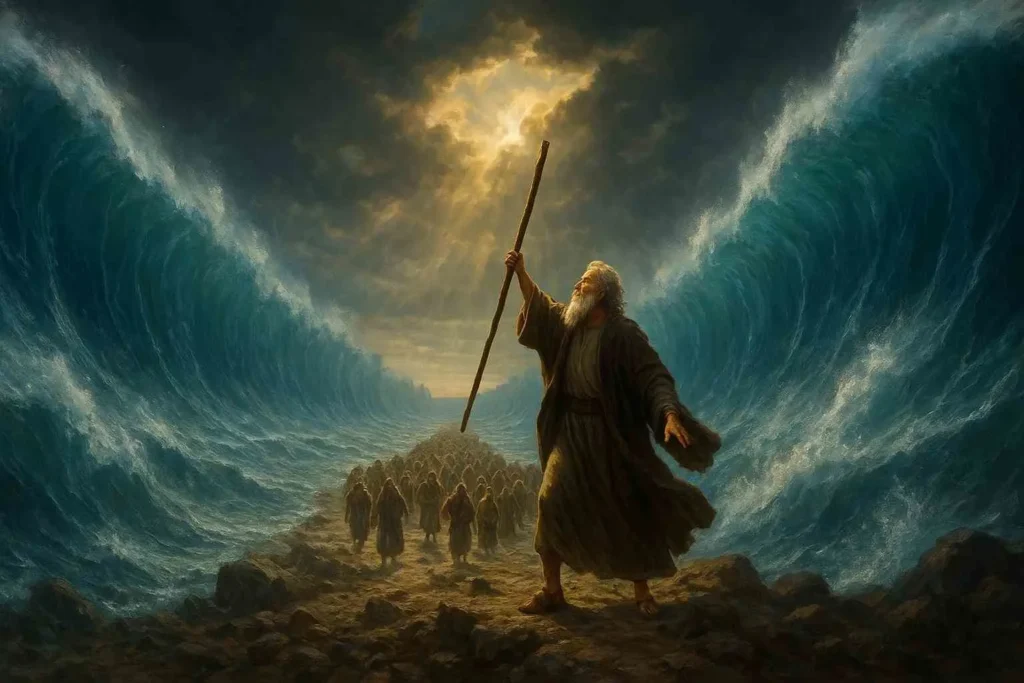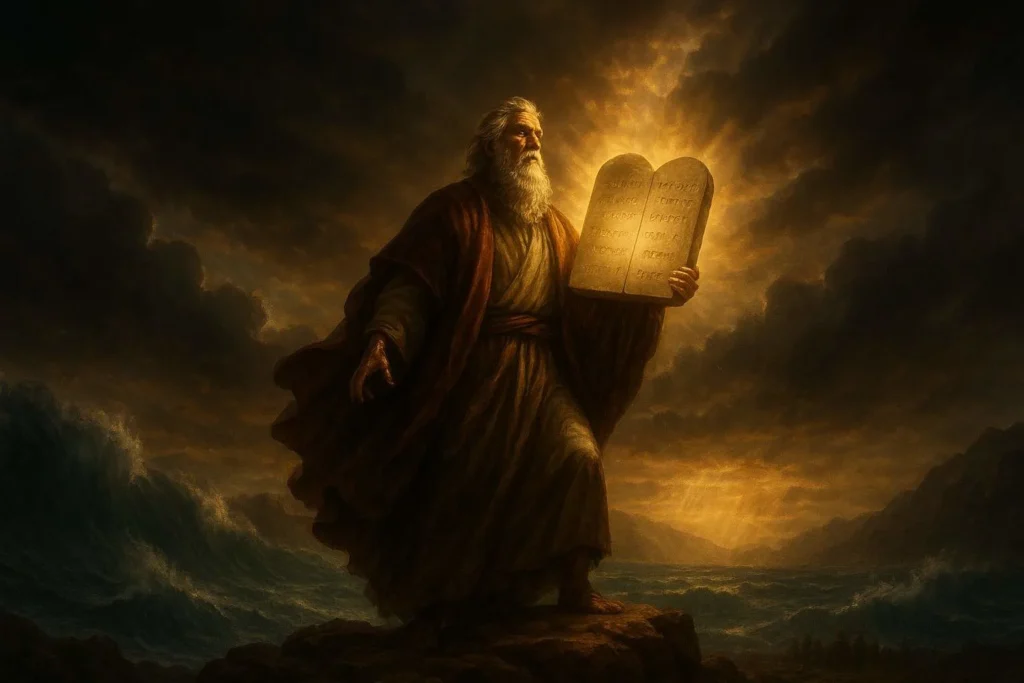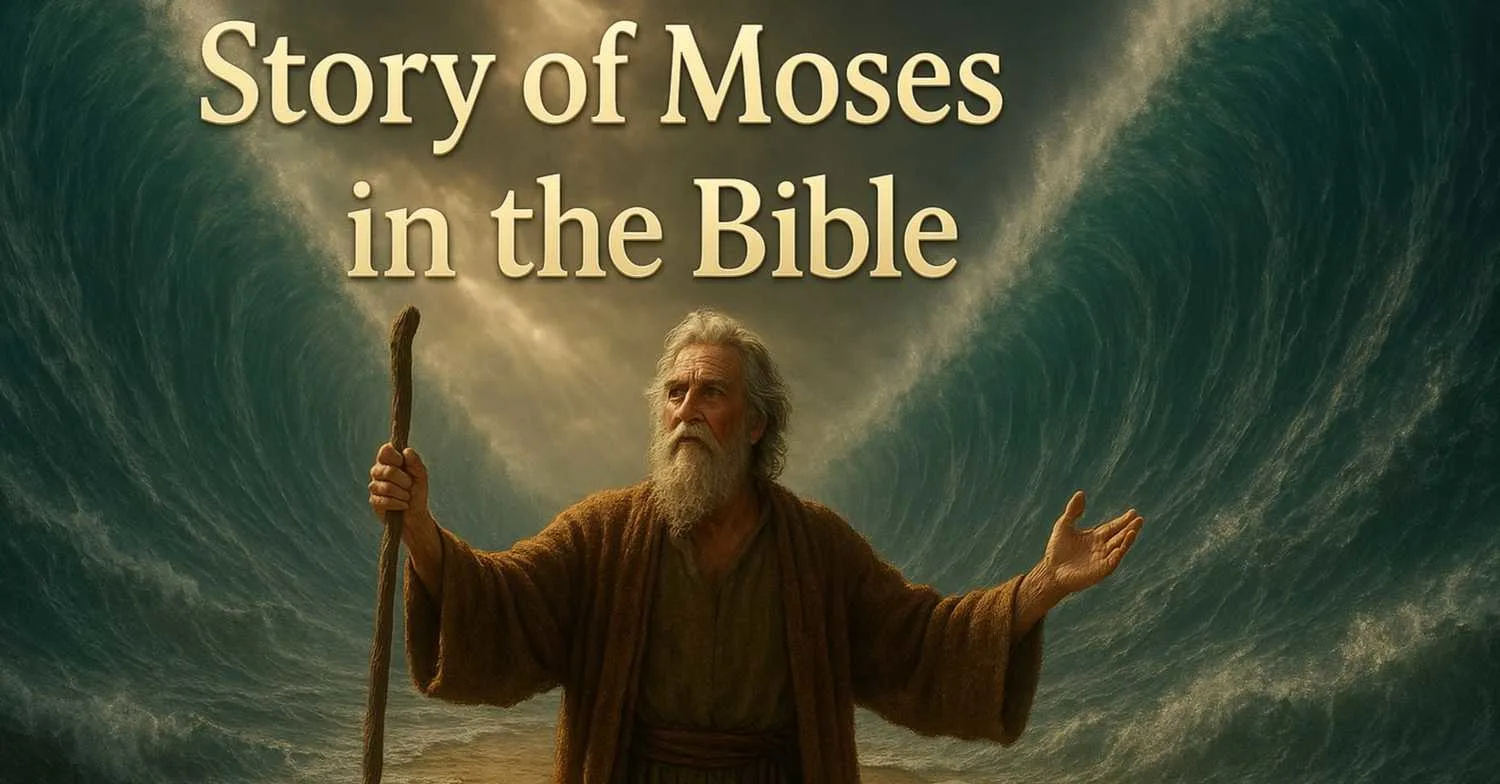The Story of Moses in the Bible is one of the most inspiring journeys of faith. Moses was chosen by God to lead His people from slavery to freedom. He spoke with God face to face and received the Ten Commandments on Mount Sinai. But the story of Moses is not just about history it is about God’s power, His covenant, and His unending love. As we walk through his life, we discover lessons of faith and obedience that still guide us today.
Background of Moses’ Life
Birth of Moses and Pharaoh’s Decree
The story of Moses begins in Egypt. Pharaoh feared the growth of the Israelites and ordered every Hebrew baby boy to be killed. But God had a plan for Moses even before his birth.
Rescue by Pharaoh’s Daughter
Moses’ mother placed him in a basket and set him on the Nile River. Pharaoh’s daughter found the baby and took him as her own son. God protected Moses and prepared him for a special purpose.
Moses’ Upbringing in Egypt and Identity as Hebrew
Moses grew up in Pharaoh’s palace with royal education.
Yet he never forgot that he was a Hebrew. This gave him a unique identity raised in Egypt but chosen by God to deliver His people.
“Moses struggled with his identity raised in the royal courts of Egypt, yet belonging to Israel. His journey from self-doubt to God’s chosen leader reveals how God shapes us through simple faith.”
God’s Call to Moses
The Burning Bush at Mount Horeb
One day, Moses saw a bush that was burning but not consumed. From that bush, God called him by name. This moment changed his life forever. Moses’ Reluctance and God’s Assurance
At first, Moses was afraid and felt unworthy. He said he was not a good speaker and could not lead.
But God promised, “I will be with you.” This assurance gave Moses the courage to accept God’s call.
The Exodus Story from Egypt
Pharaoh’s Hard Heart and the Ten Plagues
Moses told Pharaoh to let God’s people go. But Pharaoh’s heart was hard, and he refused. So God sent ten plagues upon Egypt.
1. Water turned into blood
2. Frogs covered the land
3. Lice came upon people and animals
4. Swarms of flies filled Egypt
5. Disease killed livestock
6. Painful boils broke out on the skin
7. Hailstorm destroyed crops
8. Locusts ate whatever was left
9. Darkness covered Egypt for three days
10. Death of every firstborn in Egypt
Each plague showed God’s power. Still, Pharaoh resisted until the final plague.
Passover Night and Deliverance
On the night of the last plague, God gave Israel the command of Passover. The blood of the lamb was placed on their doorposts. Death passed over their homes, but struck Egypt. At last, Pharaoh let Israel go free.
Crossing of the Red Sea
Pharaoh changed his mind and chased the Israelites. The people were trapped between the sea and the army. God told Moses to stretch out his staff. The sea parted, and Israel crossed on dry ground. When Egypt’s army followed, the waters returned and drowned them. God gave His people complete victory.

God’s Guidance in the Wilderness
Pillar of Cloud by Day, Pillar of Fire by Night
As the Israelites journeyed, God never left them. A pillar of cloud guided them during the day.
At night, a pillar of fire gave them light. This showed God’s presence and protection.
Provision of Manna and Water from the Rock
In the desert, the people had no food or water. God sent manna from heaven each morning.
He gave water from a rock when Moses struck it. God proved that He is faithful and provides for His children.
The Ten Commandments at Mount Sinai
God Descends on Mount Sinai
After the people reached Mount Sinai, God called Moses to the mountain. Thunder, lightning, and a thick cloud covered the mountain. The Lord came down in fire, and the mountain trembled. This was a holy moment, showing God’s glory and power.
The First Stone Tablets
God gave Moses the Ten Commandments written on stone tablets. These laws showed God’s will for His people. They taught Israel how to worship God and live with one another.
The Golden Calf Incident
While Moses was on the mountain, the people grew impatient. They made a golden calf and worshiped it. Moses came down, saw their sin, and broke the tablets in anger. This showed the danger of disobedience and idolatry.
Renewed Covenant: Second Set of Tablets
Moses went back to God in prayer for forgiveness. The Lord showed mercy and gave a second set of tablets. This covenant reminded Israel that God is merciful and faithful.

Moses’ Leadership & Lessons of Faith
Moses as Mediator Between God and Israel
Moses often stood between God and the people. He prayed for them when they sinned.
He delivered God’s words and guided them with patience. Through him, we see the role of a faithful servant leader.
Qualities of Moses’ Leadership
Moses’ life gives us powerful lessons in leadership:
- Humility – He never claimed glory for himself.
- Obedience – He followed God’s commands even when it was hard.
- Intercession – He prayed for his people with a loving heart.
These qualities made Moses a true servant of God.
Lessons for Believers Today
The story of Moses teaches us to trust God in every situation. It shows that God uses ordinary people for great purposes. We learn the value of prayer, patience, and faith. Just as God was with Moses, He is with us today.
Final Journey to Mount Nebo
God Shows Moses the Promised Land
Moses led Israel to the border of the Promised Land. From Mount Nebo, God showed him the land flowing with milk and honey. Moses saw the future home of God’s people, though he could not enter it. This was both a moment of fulfillment and deep faith.
Moses’ Death and Burial by God
Moses died on Mount Nebo at the age of 120. The Bible says God Himself buried him in Moab. No one knows his exact resting place. His death was peaceful, and his eyes were still strong. God honored Moses as His faithful servant.
Legacy of Moses in Scripture & Faith
Moses in Jewish Tradition
For the Jewish people, Moses is the greatest prophet. He received the Torah and gave God’s law to Israel. He is remembered as the leader who brought freedom and covenant.
Moses in Christianity (Foreshadow of Christ)
In Christianity, Moses points to Jesus Christ. Just as Moses delivered Israel from slavery, Jesus delivers us from sin. Moses was a mediator of the old covenant, while Christ is the mediator of the new. His life foreshadows the greater salvation in Christ.
Moses in Islam (Prophet Musa)
In Islam, Moses is known as Prophet Musa. He is highly honored in the Qur’an.
Muslims remember him as a messenger who guided his people with God’s truth.
His story is a sign of God’s power, mercy, and justice.
Summary of the Story of Moses
From basket to burning bush, from Pharaoh’s palace to God’s mountain, the story of Moses is truly a journey of faith. Moses was born at a time when Pharaoh had ordered the death of Hebrew babies. Yet, God preserved his life by placing him in a basket on the Nile, where Pharaoh’s daughter found and raised him. This showed that God had chosen Moses even before he could speak.
As a young man, Moses struggled with his identity raised in the royal courts of Egypt but belonging to the people of Israel. In God’s perfect timing, He revealed Himself to Moses at the burning bush on Mount Horeb. There, Moses heard God’s voice and received the call to deliver His people. Though he felt weak and unworthy, God assured him, “I will be with you.”
The mission was not easy. Pharaoh’s heart was hard, and Egypt faced ten plagues before Israel was finally set free. On the night of Passover, God’s people were delivered by the blood of the lamb, pointing us toward Christ, the true Lamb of God. When the Israelites stood trapped between the Red Sea and Pharaoh’s army, God opened the waters and gave them victory.
In the wilderness, God guided them with a pillar of cloud by day and a pillar of fire by night. He provided manna from heaven and water from the rock. At Mount Sinai, He gave His law through Moses, revealing His holiness and covenant. Even when the people sinned by worshiping the golden calf, God showed mercy and renewed His covenant, teaching us that His grace is greater than our failures.
Moses was not just a leader; he was a mediator, intercessor, and servant of God. His humility, obedience, and prayerful spirit made him one of the greatest examples of faith. Yet even he could not enter the Promised Land. From Mount Nebo, he only saw it from afar before God Himself laid him to rest.
But the legacy of Moses lives on. In Jewish faith, he is the giver of the Law. In Christianity, he foreshadows Christ the Deliverer and Mediator of a greater covenant. In Islam, he is honored as Prophet Musa, a messenger of truth. Across faith traditions, his story reminds us of God’s power, promises, and presence.
The story of Moses is not just ancient history it is God’s testimony of what He can do with a life surrendered to Him. It teaches us that faith can overcome fear, obedience can break chains, and God’s grace can turn weakness into strength. Just as God was with Moses, He is with us today, guiding, providing, and leading us toward His promises.
FAQs: Story of Moses in the Bible
Who was Moses according to the Bible?
Moses was God’s chosen prophet who led Israel out of slavery in Egypt, received the Ten Commandments, and guided God’s people in the wilderness.
What lessons can we learn from Moses’ story?
The story of Moses teaches faith, obedience, and humility. It shows that God uses ordinary people to accomplish extraordinary purposes.
Why did Moses not enter the Promised Land?
Moses was not allowed to enter because he disobeyed God at Meribah by striking the rock instead of speaking to it. Yet God still honored him as His faithful servant.
What is the significance of the Ten Commandments?
The Ten Commandments reveal God’s holy will. They guide us in loving God and living rightly with others, forming the foundation of biblical law.
How is Moses viewed in Christianity and Islam?
In Christianity, Moses foreshadows Christ as deliverer and mediator. In Islam, Moses (Prophet Musa) is honored as a great prophet who received God’s guidance for his people.
Conclusion
The story of Moses is more than a tale from ancient times. It is God’s living Word that speaks to our lives today.
Just as God guided Israel with a pillar of cloud by day and fire by night, He still guides His people through the Holy Spirit. His presence never left Moses, and His presence never leaves us. The God who opened the Red Sea is the same God who opens impossible doors for His children today.
Moses teaches us that true greatness is not found in power or position, but in obedience and humility before the Lord. His life reminds us that even when we feel weak, God’s strength is enough. When we pray, when we trust, and when we walk in faith, God works wonders that we could never achieve on our own.
The journey of Moses is also a mirror for our own journey. Each of us faces “Egypts” of bondage, “Red Seas” of fear, and “wilderness” seasons of testing. But God is faithful. He provides, He protects, and He fulfills His promises in His perfect time.
May the story of Moses inspire us to walk closely with the Lord, to listen for His voice, and to trust His leading. Just as Moses looked toward the Promised Land, we too look forward to God’s eternal promise in Christ Jesus.
Let us take courage from Moses’ faith and choose to live each day in obedience, humility, and devotion to the God who still leads His people today.

